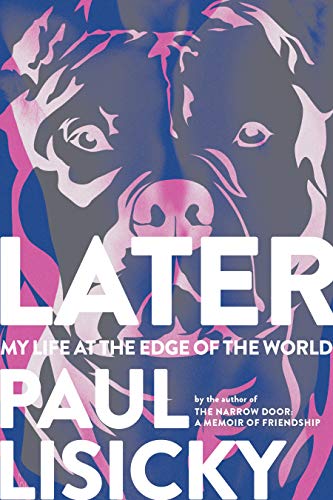Later: My Life at the Edge of the World

In the early ’90s, novelist Paul Lisicky was awarded back-to-back literary fellowships that brought him to Provincetown, RI, one of a group of colleagues paid to nurture their craft. For Lisicky a Floridian, it also allowed him to break free from the straight world he grew up in and a chance to live openly as a gay man in American’s gay mecca.
But Provincetown in the AIDS era was a much different place before the emergence of effective HIV/AIDS drugs. Even though gay America had never been more united in solidarity and visibility in their activism to take care of their own and lead the fight against AIDS, it was also a time of profound crisis as a generation of gay men faced mortality in the prime of their lives. Lisicky revisits those perilous years in his emotionally raw exposé, Later: My Life at the Edge of the World.
The author recently told the New York Times that “It occurred to me that a lot of my previous work was invested in the management of feeling, and if the version of me I was writing about was confused or full of rage, I would find some way to process that emotion into something more palatable. This book on a certain level was about the tension between a performative emotion and raw feeling.”
Many gay men in those years in Provincetown were living out what would be their last months as the LGBTQ+ community rocked with profound grief at the epidemic’s toll, even as it was united in activism to fight the disease and nationwide homophobia.
The book’s structure is jarring, and its rhythm fragmented and deliberately incomplete. Nothing is buttoned up into a neat, conclusive narrative. Lisicky time travels to a brief episode of the straight, oppressive world in Florida. Even after he moves he is not officially out to his parents, His parents are divorced, and the dual overarching dynamics created distance and non-communication. But his mother knew enough to worry about him contracting HIV/AIDS in Provincetown.
His unfiltered voice is a primal scream throughout the book as Lisicky tries to navigate being an emotional and sexually active gay man looking for love and personal liberation in a catastrophic time. Along with the constant anxiety of being infected, there was repressed anger: there didn’t seem to be any hope that a cure was in sight even after a decade.
He recounts how difficult it was to lead a sexual and romantic life when sex between men, from casual hook-ups to committed relationships, was supposed to include mutual safe-sex guidelines, and not everyone was on the same page. Add to that drugs and alcohol with which judgment can get hazy and safe sex can get lost in the course of events.
Lisicky had a string of affairs during his time in Provincetown, some club hook-ups, casual affairs, many where he fell in love, and revisits them in Later with cynicism and self-effacing humor. Admirably, he doesn’t blanch at being graphic for someone who is now a professor of literature, but he also keeps hitting the same chord, for instance, in prose tantrums about his own insecurities.
Lisicky was lusting for a hot man who was already in an open relationship and was honest about it and straight-up about the dynamics with his partner Paul, who, in the end, couldn’t deal with it emotionally. Meanwhile, he also complains about the academic requirements of his fellowship, as he introduces his fellowship colleagues, who sound just as interesting as his lovers, but he gives them the short narrative shrift.
Lisicky becomes more involved with the Provincetown AIDS activist community and balances his time helping a friend’s lover who is in the last stages of the disease. The ways that they connect, and not, is written without sentimentality, but a more genuine sensitivity. You also get the sense that Lisicky was more involved with activism and selfless in doing what he could to help the community.
Later: My Life at the Edge of the World sags in spots like a relentless diary of ennui and the author basically being pissed off at everything, obsessing on relationship drama and unresolved family matters. But ultimately it is a frank remembrance of things past, and almost despite its author’s efforts it becomes more than a self-lacerating confessional.